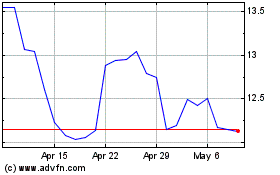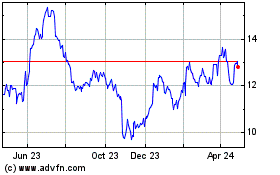AutoNation Hits Record EPS, But Counsels Caution
July 29 2016 - 1:20PM
Dow Jones News
AutoNation Inc., benefiting from continued growth in demand for
higher margin trucks and sport-utility vehicles, will continue
pairing back inventory levels as the wider auto industry braces for
a plateauing of U.S. light-vehicle sales after six years of
uninterrupted growth.
The largest auto retailer in the U.S. said it earned
second-quarter net income of $112 million, or $1.08 per share, from
continuing operations compared with $115 million, or $1 per share,
the same period a year ago. Revenue of $5.4 billion during the
period outpaced second-quarter 2015 by 4%.
Analysts expected earnings of $1.05 per share on $5.5 billion in
revenue for the period.
AutoNation, based in Fort Lauderdale, Fla., has been reducing
inventory as industry volumes level off following six consecutive
years of industry growth. It reduced its stock by 6,000 vehicles in
the April-through-June period compared with the first quarter, and
will continue reducing to its normalized level in the third
quarter.
The retailer's view on the U.S. market reinforces the cautionary
tone raised by Ford Motor Co. on Thursday. The No. 2 U.S. auto
maker reported a decline in second-quarter earnings and warned the
back half of 2016 could be softer than initially expected, due
partially to a cooling off in the American light-vehicle
market.
While overall U.S. auto sales were up in the first six months of
2016 vs. 2015's record pace, retail sales—or cars sold at dealer
lots—were off 2% industrywide, AutoNation said. Sales to fleet
buyers, including commercial customers and rental-car lots, are
currently carrying the market.
In a press release, AutoNation said auto makers are still
setting sales goals that are too high and that those targets,
combined with higher discounts, are leading to "irrational"
behavior in the marketplace. Ford, Nissan Motor Co., and Fiat
Chrysler Automobiles are three companies AutoNation identified, and
the retailer said it doesn't participate in sales-target programs
that are unrealistic.
The industry can expect the seasonally adjusted annual rate to
hover around 17 million for the foreseeable future, Chief Executive
Mike Jackson said in an interview. He remonstrated the idea that
the SAAR should rise by 500,000 units each year. When auto makers
"overproduce" in that kind of environment, he said, they "get
stuck" with high incentives.
"Hopefully (auto makers are) going to moderate their
expectations," and adjust course accordingly, Mr. Jackson said. He
noted several other large auto dealer groups are also pulling back
on inventory.
Trucks are still the de facto vehicle choice for U.S. consumers,
he said.
"Gas prices are down and the American people are stampeding"
toward trucks, he said, echoing a sentiment he shared earlier this
year when he told The Wall Street Journal, "America's gone
completely truck crazy."
AutoNation has also refused to sell used vehicles with open
safety recalls, including a large percentage of cars and light
trucks affected by potentially-defective Takata Corp. air bags. The
retailer said Friday that 20% of its used inventory is on hold, but
$3 million in expected compensation from auto makers will help
offset costs.
Write to Jonathan Bach at jonathan.bach@wsj.com
(END) Dow Jones Newswires
July 29, 2016 13:05 ET (17:05 GMT)
Copyright (c) 2016 Dow Jones & Company, Inc.
Ford Motor (NYSE:F)
Historical Stock Chart
From Mar 2024 to Apr 2024

Ford Motor (NYSE:F)
Historical Stock Chart
From Apr 2023 to Apr 2024
